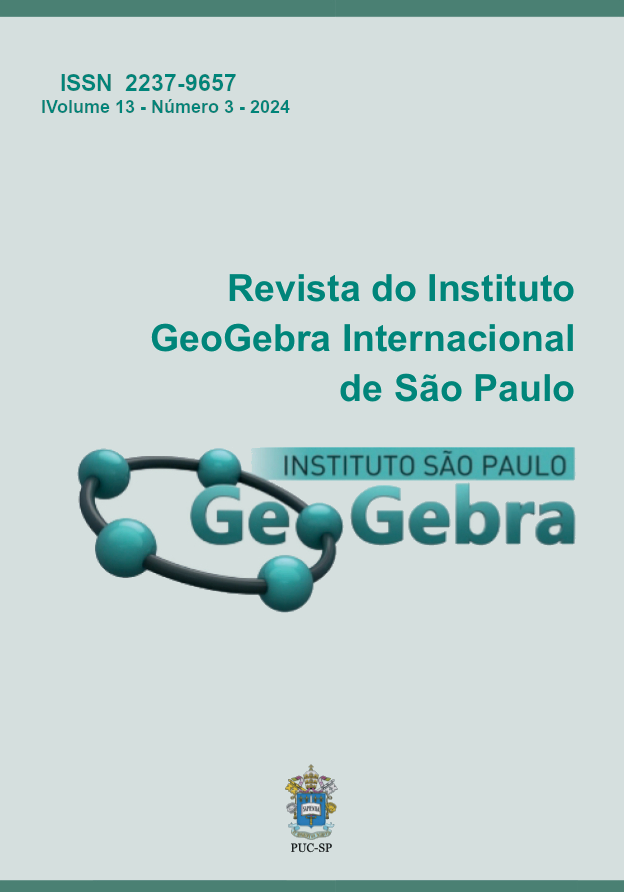Visualization of elements of the Ascoli-Arzelà Theorem with GeoGebra software tools
DOI:
https://doi.org/10.23925/2237-9657.2024.v13i3p141-154Keywords:
Ascoli-Arzelà Theorem, Equicontinuity, Uniform ConvergenceAbstract
The assimilation of concepts such as equicontinuity and uniform convergence is challenging due to their abstract nature and the complex interplay between different parameters present in their definitions. The aim of this article is to explore the use of GeoGebra software tools in visualizing the concepts of continuity and convergence present in the statement of the Ascoli-Arzelà Theorem. The methodology is based on using the Tracing and Slider tools of the GeoGebra software to analyze the variation of parameters present in the definitions of the concepts studied. The proposed visualization techniques are validated by its application to examples and counterexamples of each concept presented throughout the text. It is expected that the visualization techniques presented in this work can contribute to the teaching of these concepts.
References
ALVES, F. R. V. Exploração de noções topológicas na transição do Cálculo para a Análise Real com o GeoGebra. Revista do Instituto GeoGebra Internacional de São Paulo, v. 1, n. 1, p. 165-179, 2012.
ALVES, F. R. V.; NETO, H. B. Interpretação geométrica de definições e teoremas: o caso da Análise Real. In: CONFERÊNCIA LATINOAMERICANA DE GEOGEBRA, 1., 2012, Montevidéu. Anais... Montevidéu: Editora Universitária, 2012. p. 322-329.
ALVES, F. R. V.; FONTENELE, F. C. F.; LUCAS, C. M. do N. Descrição gráfico-geométrica de exemplos e teoremas com apoio do Geogebra: convergência de funções. Essentia: Revista de Cultura, Ciência e Tecnologia, Sobral, v. 17, n. 2, p. 112-137, jun. 2016.
BOTTAZINI, U. The Higher Calculus: A History of Real and Complex Analysis from Euler to Weierstrass. New York: Springer Verlag, 1986.
GRAY, J. The Real and the Complex: A History of Analysis in the 19th Century. New York: Springer Verlag, 2015.
GOMES, D. O. et al. Quatro ou Mais Pontos de Vista sobre o Ensino de Análise Matemática. Bolema: Boletim de Educação Matemática, v. 29, n. 53, p. 1242-1267, 2015.
LACERDA, G. K. S. et al. A compreensão do Teorema Fundamental do Cálculo em uma atividade exploratória com o uso do GeoGebra. Revista do Instituto GeoGebra de São Paulo, v. 9, n. 2, p. 35-51, 2020.
LIMA, E. L. Curso de Análise. Rio de Janeiro: Associação Instituto Nacional de Matemática Pura e Aplicada, v. 1, 14.ed., 2013.
MAZZI, L. C. Experimentação com o GeoGebra: revisitando alguns conceitos da análise real. Dissertação (Mestrado em Educação Matemática) - Universidade Estadual Paulista, Instituto de Geociências e Ciências Exatas, Rio Claro, 2014.
MOREIRA, P. C.; VIANNA, C. R. Por Que Análise Real na Licenciatura? Um Paralelo entre as Visões de Educadores Matemáticos e Matemáticos. Bolema: Boletim de Educação Matemática, v. 30, n. 55, p. 515-534, 2016.
NASCIMENTO, A. G. C., ESQUINCALHA, A. C. Construção de um GeoGebra Book para estudo de Cálculo e Análise. In: SEMINÁRIO DE PESQUISA “DESENVOLVIMENTO CURRICULAR, FORMAÇÃO DE PROFESSORES E TECNOLOGIAS EM EDUCAÇÃO MATEMÁTICA”, 1., 2017, Santo Antônio de Pádua. Anais... Santo Antônio de Pádua: PROPPI/UFF, 2017. p. 52-56.
OTERO-GARCIA, S. C.; BARONI, R. L. S.; MARTINES, P. T. Uma trajetória da disciplina de Análise e o seu papel para a formação do professor de matemática. Educação Matemática Pesquisa, São Paulo, v. 15, n. 3, p. 692-717, 2013.
PINTO, M. M.; SCHEINER, T. Visualização e ensino de Análise Matemática. Educação Matemática Pesquisa, São Paulo, v. 17, n. 3, p. 638-654, 2015.
REIS, F. S. A Tensão entre Rigor e Intuição no Ensino de Cálculo e Análise: a visão de professores-pesquisadores e autores de livros didáticos. Tese (Doutorado em Educação) – Universidade Estadual de Campinas, Campinas, 2001.
Downloads
Published
How to Cite
Issue
Section
License
Copyright (c) 2024 Journal of the GeoGebra International Institute of São Paulo

This work is licensed under a Creative Commons Attribution 4.0 International License.
Submission, processing, and publication of articles sent to the journal and registration of the DOI at Crossref is free of charge.
Authors retain their copyright and grant the journal the right of first publication of their article, which is simultaneously licensed under a Creative Commons - Attribution 4.0 International license CC BY that allows others to share the article by acknowledging its authorship and initial publication by the journal.
The GeoGebra journal encourages its authors to register their work with information and communication management systems aimed at researchers, such as Academia.edu, Mendeley, ResearchGate, etc.


 10.23925
10.23925
